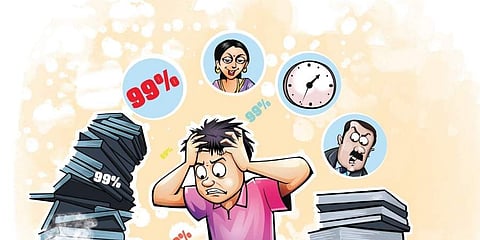

Exams are not very hard. People find them hard because they don’t work — it’s just a matter of labour. Once you actually start doing it, it’s like cracking eggs. You don’t need to be smart.
As everything is in life, it’s about concentration.
— Lawrence Osborne, British novelist
Apparently, Lawrence Osborne is a happy-go-lucky man, not caring about any steadiness in life. But life expects students to score high to get lucrative careers. This has made exams a fearsome experience for students, who become depressed or mentally affected.
It is in this context that we have to view a move in Karnataka to introduce public exams for 7th-grade students so that some of them can be prevented from going to the next higher class automatically. But fortunately, this has evoked opposition from another official body, as reflected in mid-October media reports as noted below.
The Karnataka State Commission for Protection of Child Rights (KSCPCR) has issued a show-cause notice to the Department of Primary and Secondary Education, seeking an explanation on the decision to introduce public examination for class 7 students. In a letter to the Principal Secretary of the department, the chairperson of the Commission has stated that such exams were against the mandate of the Right of Children to Free and Compulsory Education Act, 2009 and other constitutional provisions.
According to the RTE Act, the Commission is the sole monitoring body for effective implementation of the Act. Quoting Section 30(1) of the Act, the commission has said that no child shall be required to pass any board examination till the completion of elementary education. “It can be clearly understood from a simple reading of the original Act and the amended Act that there shall be no board/public exam till the completion of elementary education. However, there can be a regular examination at the end of classes 5 and 8, and whether to detain [the student] or not shall be decided by the appropriate government authority,” the KSCPCR letter states.
The Commission has also said there is a difference between public and regular exams. A public exam could create fear and trauma in students. “A rigorous public exam will in no way help evaluate a child’s attitude, aptitude, knowledge or skills acquired,” the letter states. The Commission believes that a regular exam conducted in the classroom by the subject teacher in a child-friendly environment would be a better idea. Such an exam will help analyse the skills acquired by the child without subjecting him or her to stress, it says. It seems that some schools take perverse pleasure in torturing students with needless exams. In this context, the Karnataka government has prohibited playschools from subjecting the tiny tots to exams and interviews to determine their admission.
